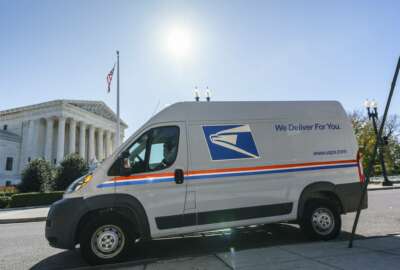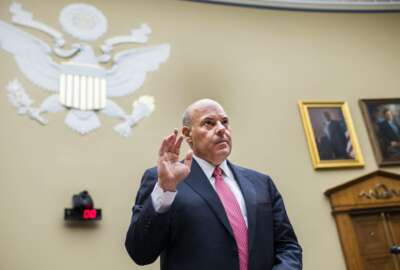

The Postal Service could've set up a way to track ballots that went through its expedited process, but an agency executive stressed USPS made the speed of delivery...
When the Postal Service swept 220 mail-processing facilities last night, looking for any postmarked ballots not yet expedited to local election boards, plant managers came back with an unremarkable 13 ballots left behind in two sites in Pennsylvania.
But Wednesday evening, following another order from a federal judge in charge of multiple USPS election mail lawsuits, USPS reported that plant managers in Texas found another 815 ballots left behind that have now been delivered to local election officials.
The discovery of these ballots, while unlikely to have a direct impact on election results in either of those states, marks the latest point of contention in an ongoing legal battle about the readiness of USPS to deliver a historic volume of mail-in ballots during the COVID-19 pandemic.
Kevin Bray, the head of 2020 election mail processing for USPS, told lawyers for the plaintiffs in several election mail lawsuits that USPS doesn’t yet have clear data on the number of postmarked ballots still in its system that will be delivered in states that will still accept them, but expects to provide that data to the court by Thursday morning.
The added scrutiny from plaintiffs stems in part from USPS data showing that about 300,000 ballots scanned into its mail processing plants didn’t receive an exit scan indicating that they went out for delivery.
Bray explained that USPS separated election mail out from the rest of the mail coming into processing plants and set it aside for expedited delivery directly to local boards of elections. Under these “extraordinary measures” authorized by USPS executives, these ballots got to election officials faster, but didn’t go through the exit scan process that ballots delivered by mail carriers have received.
“I wasn’t worried about necessarily the scans on the mail pieces as much as I was delivering the mail by the most accelerated process possible,” Bray said Wednesday in the conference call with attorneys.
Looking back, Bray said USPS could have probably set up a way to track ballots that went through this expedited process, but stressed that the agency made the speed of delivery the top priority for ballots.
“I understand that there can be confusion, but I want everybody on the call to understand we did that intentionally so we could expedite the delivery, not to cause somebody to think it’s lost,” he said.
While USPS has long-held election mail best practices, Bray said he oversaw the implementation of the extraordinary measures, knowing that the agency had gotten some “heat” from the federal courts.
“We’re all aware of the scrutiny that the Postal Service is under, so I was told we’re going to have to do everything, move heaven and earth to deliver ballot mail,” Bray said.
In the lead-up to the election, judges in more than of the dozen ongoing USPS lawsuits have issued preliminary injunctions and orders blocking operational changes led by Postmaster General Louis DeJoy, which have led to mail delays.
USPS spokesman Dave Partenheimer said in a statement that assumptions that there are unaccounted ballots within USPS are “inaccurate,” and that ballots have been delivered in advance of election deadlines.
“We employed extraordinary measures to deliver ballots directly to local boards of elections. When this occurs, by design, these ballots bypass certain processing operations and do not receive a final scan. Instead, they are expedited directly to the boards of elections,” Partenheimer said. “We remain in close contact with state and local boards of elections and we do not currently have any open issues.”
While USPS swept 220 mail-processing facilities last night, beyond the number required by D.C. District Court Judge Emmet Sullivan’s order Tuesday, the judge expressed frustration with the agency certifying the all-clear checks past the window of time that he had outlined in the early afternoon.
“It just leaves a bad taste in everyone’s mouth, for the clock to run out, game’s over, and then we find out that was not compliance with a very important court order,” Sullivan said.
While Bray debriefed the judge and attorneys for the plaintiffs on Wednesday, Sullivan said Postmaster General DeJoy should also be deposed or appear before him under oath to explain why some measures were not taken after the court issued its injunction.
“The court has been very clear that it expects total compliance with the court’s injunction. I was just shocked to hear that nothing else was done after the injunction was issued,” Sullivan said.
Copyright © 2024 Federal News Network. All rights reserved. This website is not intended for users located within the European Economic Area.
Jory Heckman is a reporter at Federal News Network covering U.S. Postal Service, IRS, big data and technology issues.
Follow @jheckmanWFED


